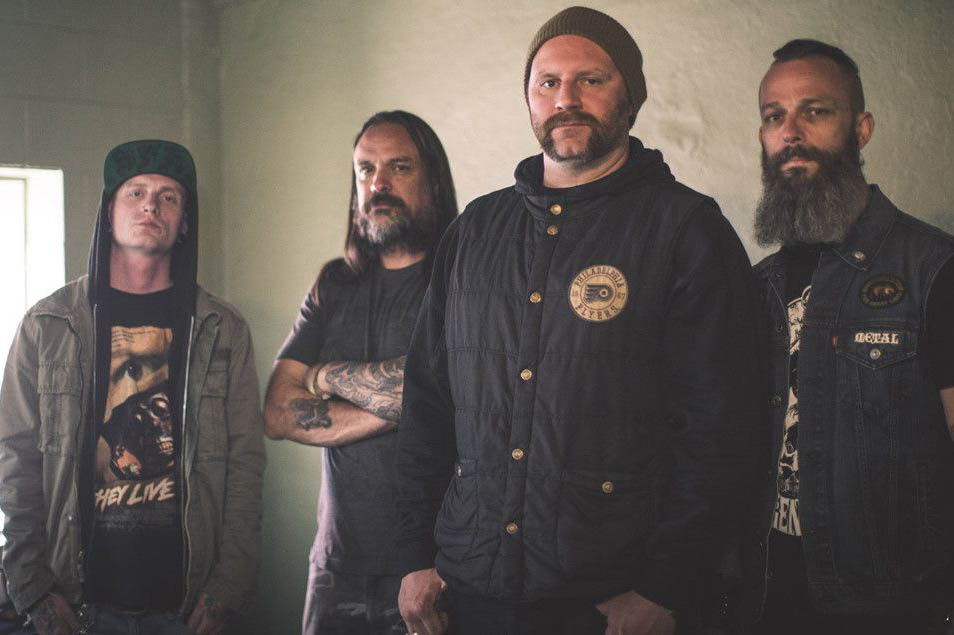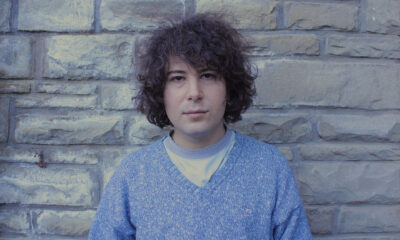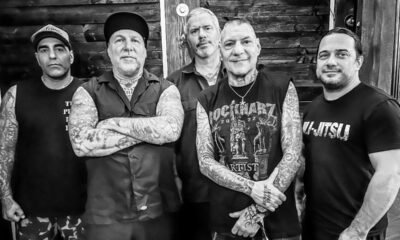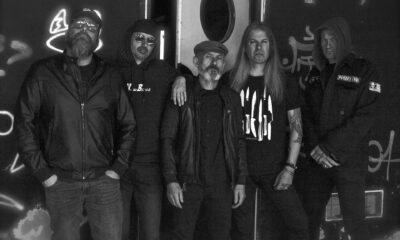Interviews
Interview with 36 Crazyfists frontman Brock Lindow
36 Crazyfists’ frontman Brock Lindow looks out the window of his snow covered home and smiles. In addition to being back home in Alaska for the holidays, Lindow and 36 Crazyfists have finally put two years of record company politics and delays behind them. Furthermore, they also finally released their explosive third album, Rest Inside The Flames.

36 Crazyfists’ frontman Brock Lindow looks out the window of his snow covered home and smiles. In addition to being back home in Alaska for the holidays, Lindow and 36 Crazyfists have finally put two years of record company politics and delays behind them. Furthermore, they also finally released their explosive third album, Rest Inside The Flames. Recorded in New Jersey with producer Sal Villaneuva (Taking Back Sunday, Thursday), Rest Inside the Flames strikes the perfect balance between ear-splitting aggression and dynamic melodies. The album finds the bands embracing a heavier direction without abandoning the strong melodies 36 Crazyfists’ fans have come to love. PureGrainAudio caught up with 36 Crazyfists frontman Brock Lindow to chat about the record and to get caught up to date on Alaska’s best musical export.
What exactly happened with Roadrunner and why did you opt to split with them in the US?
Brock: We took a little bit of a break and then jumped right into the writing of this record. We got off the road in April, finished writing at the end of summer, then started pre-production in October and finished recording at the end of January. We did a quick little run through the States and we were getting ready to go over to Europe and we were thinking that the record was coming out in June 2006 worldwide. About 2 days before we got on the plane we found out that the record wouldn’t be coming out till September in the States, but would still be released everywhere else. We got really bummed out, but then in August they told us that the record wouldn’t be coming out until January 2007 and by that point we realized where we stood with Roadrunner. We went to our manager and asked if there was any way we could get out of releasing this record with them, so we could try and go with somebody else. Everyone told us that it couldn’t be done and they wouldn’t let us go, but a week after we asked them Roadrunner came back and told us if we wanted to go somewhere else then they would let us go and they’d actually try and help us get another deal. It was pretty civil and we’re grateful that they let us go and helped us get another deal. Now the record finally came out in the States and we have a fresh start with DRT Records. Just having a fresh start with someone else is the best thing about it.
How heartbreaking was it to hear that Roadrunner didn’t want to release the record?
Brock: It didn’t surprise me because every record we did with them, there was always just a small group of people that liked our band. It was kind of hard to be on a label where you know not everyone is behind the band, so we’ve known this for years. It wasn’t surprising to me. We had to do the typical thing where the record company comes and listens to an unmixed version of the record and I remember them coming and it seemed so fake that anyone was even interested.
Is it weird to have someone, who probably isn’t a musician and isn’t involved in the creative aspect of the music, come in and be so critical of the music?
Brock: I think I’m used to it now, because when you get signed to a record contract it becomes a business. That is just another thing that comes along with being a signed band and record label guys are just trying to find dollar signs. I remember them hearing our first demos and having them say, “There is way too much screaming on this record.” It was like all the sudden they thought we tried to flip the script and be something we weren’t. We just brushed it off and didn’t let it dictate anything.
It’s completely ironic that a label like Roadrunner, who was built up by extreme bands like Deicide and Obituary, would say there is too much screaming on a record.
Brock: It was kind of funny to me as well and that’s why I don’t think that Roadrunner is into breaking new artists anymore, because you can see the bands they’ve been signing recently have all been established acts. Bands like Megadeth, Black Label Society and Hatebreed all have an established fanbase and don’t need any extra help. So when I heard that there was “too much” screaming on our record, we knew things had changed. These people can get into your head sometimes and once those things start happening you can start second guessing yourself, but I think you just have to stay true to yourself. We know we’re not a perfect metal band and we don’t sell tons of records so the excitement at the label was dwindling for the past few years. This band has been together for twelve years and we’re in this for the marathon and not the sprint. We’ve been creating music together now for so long that we know we’re not going to be everyone’s favorite band, but we do have a loyal following of fans. That’s what really matters to us is our fans, not being on a major label that’s going to all fall in love with us.
This record was produced by Sal the same guy who did Taking Back Sunday and Thursday, which was an odd choice when I first heard it, but now that I heard the finished version I think he was perfect. What did he bring to the table as a producer that made you say, “He’s our guy?”
Brock: We had a lot of fun with Sal Villaneuva and he made us the most comfortable in the studio we’ve ever been. He was always busting up jokes and just having a lot of fun. He also had a lot of good ideas with the music. The one thing I was trying to get across lyrically was just that we are a band that has gone through some dark times, but we definitely trying to push a positive message. For us, we’re just trying to get across things that are a little more hopeful. The title Rest Inside the Flames just came from me looking around and seeing how heavy life is right now and how bleak things are, which kind of symbolizes the flames. On the other hand, me personally, I’m just excited to be alive and I just want to seek out new things. I think if people watch too much television it generates a lot of fear and I think sometimes we just need to turn it off, take some deep breathes and hang out with family and friends. That was the main thing I was trying to get across, because I think if you dwell too much on all the things that are going on then it’ll seem scary and you’re ambition to progress could be hampered. The media is a big scare tactic and while it’s good to be aware of things, I don’t think you have to dwell on them 24-7. We can walk outside today and get hit by a truck, right? We’re all human, so we’re all going to die someday, so why not try and enjoy your life?
Is it about showing listeners the light at the end of the tunnel so to speak?
Brock: I think so, because that’s the only way I can get through. I used to be a mess and I don’t know what triggered these things. I read Lance Armstong’s book “it’s Not About The Bike” and I look back and think that might have been the start of the path that I’m on now. I think just his story was so inspiring to me and when I read it I said to myself, “What am I doing? I gotta get up off the couch and do something.” His story is so inspiring and what he overcame just sparked things for me. For me, I need that light otherwise I’ll fall back into a rut and can find myself making the same mistakes that I made in my early 20’s.
This new record is heavier, but at the same it’s also some of the most melodic stuff you’ve ever done before.
Brock: I did want the record to have more heavy stuff on it. I’m a big fan of heavy music and I definitely wanted to keep getting a little heavier. The bands that I’ve always loved, I’ll like their first record and then they go the complete opposite direction on the next album. I definitely don’t want to do that to anyone that’s into our band and I always want to be on the same path we’ve always been on, but hopefully introduce something new. We don’t want to take a complete left turn and do a whole record of acoustic ballads or anything. I think that the melodic stuff has always been a part of the band, so I hope we’re just getting a little better at it and can make it sound a little catchier. There wasn’t much thought with this album, we just did what we always do and that’s get in a room and hammer it out. If it sounds good we’ll keep it and if it doesn’t then we’ll scrap it. We’re not the fastest writing band in the world, but certain songs came together fast and others made us want to punch ourselves in the face.
I think the melodic vocals on this record sound a little bit more powerful than previous albums.
Brock: Hopefully over the years we’ve just kept getting better, but it’s hard for me to tell because I’m so close to it. I think I’m definitely more comfortable this time around with my recorded scream. Screaming live, it is what it is, but screaming on a record doesn’t always sound the same. I think over the past couple of records I’ve just felt a lot better about the screams being recorded and I think I’m just getting a lot more comfortable with screaming in general.
I also thought this record sounded a little more raw and represented what you sound like live.
Brock: That was definitely the plan. For the past few years, everyone has always said, “Man you guys are so much heavier live.” That never really sat well with me because I wanted that aspect of our sound to be portrayed on our records too. That was something that mentioned a few times and I think we did come across a bit better with this release than we have in the past.
Sal Villaneuva seems like such and odd choice for a producer, especially when he’s known for producing bands like Taking Back Sunday and Thursday, but after you hear the record you realize he’s the perfect fit.
Brock: Well Sal was actually one of our first choices for our last album, but his schedule conflicted with ours. So when it came around to doing this record, we said “let’s try and get Sal again.” We knew he had done bands like Madball and Vision of Disorder, as well as Taking Back Sunday and Thursday. We knew he had a broad spectrum of sounds and he knew both sides of the scene. When we first started talking to me on the phone, he said all these cool things about the band and he was into bands that were an influence on us like Quicksand and Only Living Witness. We were just really on the same wave length and he really worked with me a lot more on the vocals than any producers in the past. Usually producers touch on the vocals here and there, but the first day of practice he said he needed to see my all lyrics and nobody in the past has really cared what I was singing about. I can’t pinpoint exactly what he brought to the songs, but he just became like a fifth member of the band and made us all feel really comfortable, which is good because generally the studio is so unnatural. He was just cool and would really set the vibe in the studio.
What do you think is the one thing that separates Rest Inside The Flames from the rest of the albums being released right now?
Brock: There are so many bands right now, but I think we just offer the same thing we’ve always offered, which is somewhere in the middle of everything. We’re not quite metal and not quite rock, but still heavy and melodic. I know there are a lot of bands doing that these days. I don’t think we’re re-inventing the wheel, but we are trying to put our own touch on music. We’re just trying to be extremely honest with our music and not rip anybody off. I know we didn’t start this genre by any means.
-

 Alternative/Rock22 hours ago
Alternative/Rock22 hours agoThe V13 Fix #010 w/ High on Fire, NOFX, My Dying Bride and more
-

 Hardcore/Punk1 week ago
Hardcore/Punk1 week agoHastings Beat Punks Kid Kapichi Vent Their Frustrations at Leeds Beckett University [Photos]
-

 Culture1 week ago
Culture1 week agoCirque Du Soleil OVO Takes Leeds Fans on a Unique, Unforgettable Journey [Photos]
-

 Alternative/Rock7 days ago
Alternative/Rock7 days agoA Rejuvenated Dream State are ‘Still Dreaming’ as They Bounce Into Manchester YES [Photos]
-

 Music2 days ago
Music2 days agoReclusive Producer Stumbleine Premieres Beat-Driven New Single “Cinderhaze”
-

 Culture3 days ago
Culture3 days agoDan Carter & George Miller Chat Foodinati Live, Heavy Metal Charities and Pre-Gig Meals
-

 Indie1 week ago
Indie1 week agoMichele Ducci Premieres Bouncy New Single “You Lay the Path by Walking on it”
-

 Alternative/Rock1 week ago
Alternative/Rock1 week agoWilliam Edward Thompson Premieres His Stripped-Down “Sleep Test” Music Video











